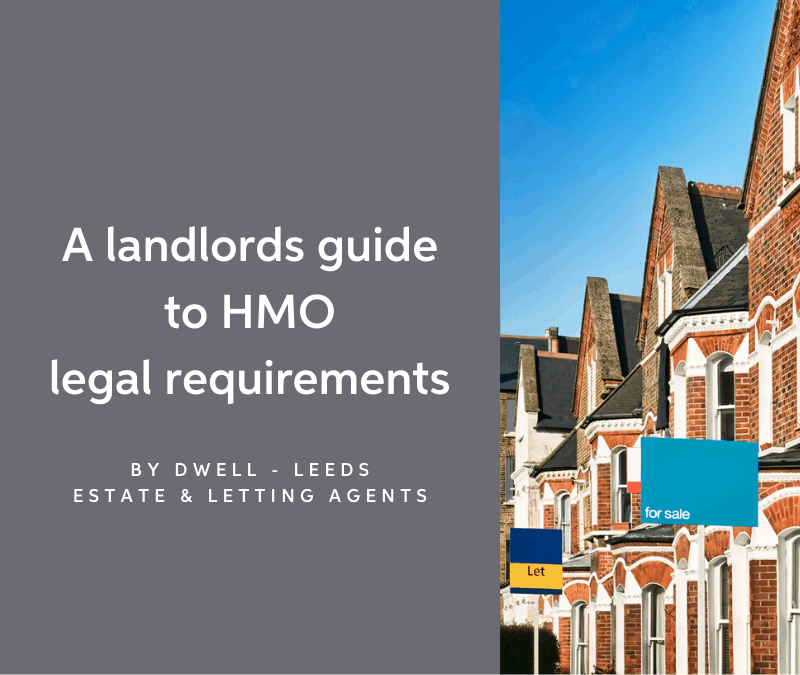A Landlords Guide To HMO Legal Requirements

Read about the legal requirements landlords need to understand when it comes to HMO’s.
What is an HMO?
With a HMO, a landlord will rent out each room in the property to individual tenants who will each have their own separate contract with the landlord, rather than one family renting an entire home.
Common areas are not technically rented out but remain in full, permanent ownership of the landlord.
The benefit of this for the landlord is a bigger profit compared to renting out the house as just one buy-to-let.
For tenants, the benefit is that there is often the opportunity to rent accommodation for less than if they were to rent an entire home.
What is HMO Licencing
The trend in landlords converting properties into HMO’s has come under fire for a few reasons. One of these is that some unscrupulous landlords cram as many tenants into their property as possible in order to maximise rental profit.
To combat this, the government has created some guidelines and regulations that need to be followed if a landlord wants to turn their property into an HMO with 5 or more occupants. If an HMO has five or more tenants its official description under the law is a “Large HMO”.
Understanding the laws involved in operating a Large HMO is important if you want to avoid legal proceedings. If you don’t follow the new legislation you could get a criminal record, and fines up to £25,000.
To help you remain compliant when it comes to Large HMO’s, here’s an overview of the latest laws (as of October 2018):
- Any tenant under 10 must have a room bigger than 4.64 m2
- Any bedroom that you rent out has to be larger than 6.51m2 for one person
- Any bedroom rented to two people has to be bigger than 10.22m2
- The property must have adequate amounts of cooking, washing and toilet facilities
- The property must have bin collections arranged
- There have to be smoke alarm and fire alarm systems that are interlinked
- Gas checks have to be completed every year by a qualified professional
- Electricity checks have to be completed every five years by a qualified professional
- Fire exits need to be clear, and the building must have a fire safety plan that all tenants have access to.
An HMO landlord requires an HMO Licence to confirm that all these conditions are met by the property.
How To Apply For A Large HMO License
You can apply for a Large HMO license through your local council who will then arrange several inspections before a license is granted. The council has total discretion over whether or not you can be granted a license.
In all cases the above requirements need to be met. However, additional factors, such as the finish and cleanliness of the property, may also form part of the overall report and decision.
The Landlord Fit & Proper Persons Test
When you put in a HMO license application you will have to go through a fit and proper person’s test as the landlord. A lack of any criminal history at all should mean that this particular test is merely paperwork. Some of the most common reasons that landlords fail the fit and proper person’s test are:
- Sexual and financial crime, or fraudulent crime convictions that are as of yet, unspent
- Discrimination convictions or listed offences
- Housing or tenant law convictions or listed offences
These tests are not black and white and each and every case should be considered on an individual basis. The point of the test is to check that you, as the landlord of a Large HMO, will not exploit your authority for financial or personal gain. The test is also checking that you’re not likely to use the property to support any criminal behaviour.
How The Large HMO Legislation Affects Buyers & Landlords
If you’re like most would-be Large HMO investors, you will likely want to go down this route because of the return on investment potential. For the most part the profit is generally larger than a standard buy-to-let arrangement.
Although the money that can be made does tend to be more substantial than with a traditional rental arrangement, there can be some additional expenses when converting a property into a HMO.
Putting in fire escape doors and fire extinguishing equipment and getting the property rewired are key examples of the kind of expenses that can occur when making this conversion to HMO.
The running of the HMO is also more expensive than a standard rental arrangement as most Large HMO’s will include bills in the rental price for tenants. Maintenance costs will also naturally be higher with more people in one property, and usually, a quicker turnaround per tenant.
HMO’s With Up To 5 Tenants
Officially, there are not any official laws that require you to have a license to run a property with up to 5 tenants individually renting rooms. However, every council has different rules and there may be specific legislation in your area that you have to abide by.
In all circumstances, it is recommended that any HMO landlord puts effort into ensuring the property is as fire safe as possible. Fire doors and interlinked smoke detectors should always be included in any size HMO.
If you are currently the landlord of a smaller HMO, expect legislation to tighten in the near future as requirements are likely to align with those that apply to Large HMO’s.
Losing A HMO License
When you have your HMO License given it is expected you will continue to uphold the same standards whilst you remain licensed. As the HMO landlord, if you don’t maintain those standards, you could lose your license.
If you have broken the license terms you may not lose the license straight away. Instead you may be fined and then receive a timed request to make necessary changes to the property.
If you then do not meet those demands you may then lose your license, although every situation is individual and is considered as such by the council.
Sadly, in some cases, your license can be lost because of a tenant, or tenants. They may be participating in criminal or anti-social behaviours which can then tarnish the standards of your property. For this reason, it is extremely important that you properly screen each tenant that you take on.
If you do lose a HMO license for any reason, you can reapply, but it can be difficult and is not guaranteed, depending on your reasons for losing the license in the first place.
Reapplying For Your HMO License
It is important to reapply for your license before the 5 years the license lasts is up. You can start to apply for a new license as early as 18 months before your current license expires.
If you do not reapply, you may receive the same punishment that a completely unlicensed HMO would. A fine of up to £20,000, a criminal record and not being able to apply for future HMO licenses are all consequences of running a Large HMO without a license.
If you are considering purchasing a property to run as a HMO, or converting a property into a HMO it is a really good idea to do your research beforehand to check that it is a viable option for you. You can find out more about a house in multiple occupation at GOV.CO.UK, RICS.ORG and with your local authority.
Current HMO landlords should keep an eye on any new HMO legislation changes to ensure they continue to comply with current HMO laws.
Written by :Dwell – Estate and Letting Agents based in Leeds






